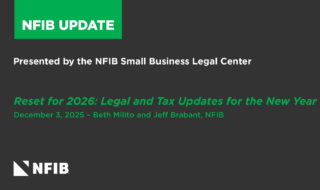Topics:
February 2, 2023
The cases involve the right to arbitrate and recover for property damages during unionized strikes
NFIB Advocates for Small Business Owners in Two Major Court Cases
Coinbase v Abraham Bielski
On Jan. 27, the Small Business Legal Center filed an amicus brief before the U.S. Supreme Court, disagreeing with the decision made by the Ninth Circuit. The lower court’s decision held that if a trial court denies a motion to compel arbitration and the filing party appeals, the filing party must simultaneously litigate the case before the trial court and litigate the arbitration appeal before the Court of Appeals. In other words, the party that filed for arbitration would be forced to argue two cases at the same time in front of two different courts. “Small businesses benefit from arbitration as an alternative to litigation, as arbitration allows owners to resolve disputes promptly and efficiently,” said Small Business Legal Center Executive Director Beth Milito. “Arbitration is often used by small business owners because it is a more cost-effective option compared to costly litigation. We are hopeful that the Supreme Court will agree and reverse the lower court’s ruling.”Glacier Northwest, Inc. v International Brotherhood of Teamsters
On Jan. 10, the U.S. Supreme Court heard oral arguments in a case where NFIB previously filed an amicus brief. This case originated when employees from a building company, Glacier Northwest, went on strike after negotiations over a new union contract hit a stalemate. Because of the strike, Glacier lost 16 loads of concrete that was already loaded into the trucks when the strike was called. Glacier sued The International Brotherhood of Teamsters over the wasted concrete, but the Washington Supreme Court concluded that the National Labor Relations Act (NLRA) preempts suits of this nature. Glacier has now asked the Supreme Court to reverse the Washington Supreme Court’s harmful decision. NFIB’s brief argues that the NLRA does not preempt suits similar to this one, and the Supreme Court’s precedent is clear that the NLRA does not immunize unions from the intentional destruction of an employer’s property. NFIB filed the brief with seven different trade associations. “This decision could create a significant imbalance of power between unions and employers and would leave small business owners with no course of action should their property be destroyed,” said Beth Milito. “NFIB urges the Supreme Court to adhere to its previous precedents and protect small businesses across the nation.”
Get to know NFIB
NFIB is a member-driven organization advocating on behalf of small and independent businesses nationwide.
Related Articles

December 24, 2025
Please Vote Your 2026 State Ballot
Choices you make center NFIB’s lobbying agenda in Salt Lake City
Read More


December 22, 2025
Webinar Provides Major Legal and Tax Updates for 2026
NFIB’s December webinar provides an update on the major legal and tax cha…
Read More


December 17, 2025
NFIB Key Votes Legislation to Address Health Care Affordability…
H.R. 6703 would expand affordable health care options for small employers a…
Read More


December 17, 2025
Small Businesses Support Legislation to Implement Bipartisan Pe…
The SPEED Act would enact reforms to reduce energy costs for small business…
Read More







